St Austell residents 'exasperated' with open heroin use
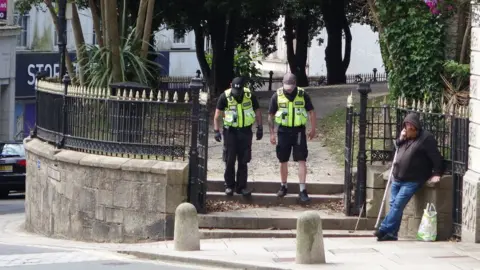 BBC
BBCOpen drug use and increasing anti-social behaviour have left residents of St Austell "exasperated". Graphic photos on social media have led to a petition being set up to "formally address the heroin problem". We went to Cornwall's largest town to talk to people about the situation.
There are "shoplifters and drug addicts everywhere", according to a retail worker in the high street, and extra police have been drafted in.
The local MP has claimed St Austell has had a "disproportionate" number of people with drug and alcohol addictions housed in the town.
Cornwall Council has disputed this but, working with the police and the Safer St Austell Partnership, is a fortnight into a six-week programme targeting the problems. And there are signs there have already been improvements.
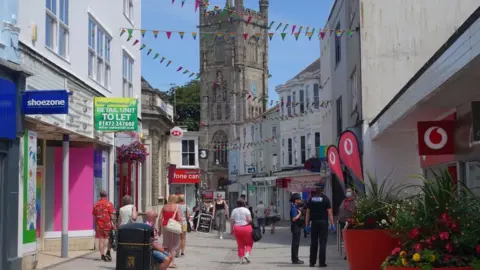 Google
GoogleWhen the BBC visited, the town centre was relatively busy with shoppers visiting national chain stores, phone shops, charity shops and bargain stores - and walking past several empty ones.
Beside Holy Trinity Church at one end of Fore Street, a group was sitting on the granite stones and grass beside the war memorial.
When they got up to leave, the ground was left littered with needles.
Jodie Richards, 27, set up the petition after seeing images of people using needles "500 yards from my front door" and feeling compelled to take action.
"The town is in a terrible place and everyone is exasperated," she said.
"It's so sad and there has been a significant increase in the last six months.
"Nobody is taking ownership of the issue and I just want the right people with the skills and experience to take action, before the wrong people do."
The petition has been signed by more than 6,000 people in a week.
"It's not even daily, it's hourly," a shop worker who did not want to be named said, describing the shoplifting and anti-social behaviour she has seen.
She recalled her horror when her four-year-old son told her he had seen a man injecting himself in the churchyard, and the frequent examples of people shouting abuse at passers by.
"Everyone is petrified. One hundred million percent it is getting worse," she said.
"Nobody is standing up to them."
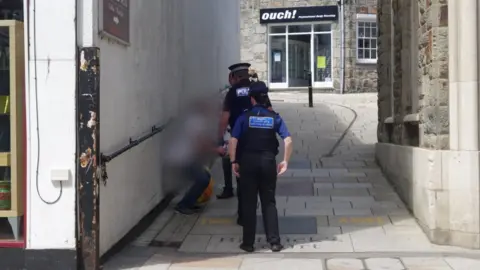
It had been hoped the creation of the £75m White River Place shopping centre in 2009 would regenerate the town but it has failed to attract high-end retail names.
The nearby Eden Project would normally attract hundreds of thousands of visitors to the area but, in line so many other tourist attractions, it was closed for more than two months because of the coronavirus pandemic and, even though it has since reopened, announced more than 200 job losses earlier in July.
Debbie and David Delara run Daisy Dukes, a Community Interest Company, a shop that is now also running a community larder near the church.
Debbie said that, during the coronavirus outbreak, many of the people who came for help "have been left to their own devices and are now at their lowest point".
Their business had never been involved with food before but they said they found "during the pandemic we had people knocking on our doors saying they were hungry".
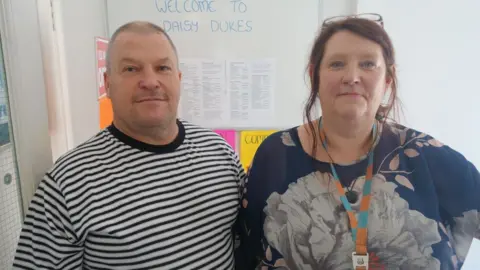
St Austell MP Steve Double has blamed the council for housing a "disproportionate" number of people in the town with drug and alcohol dependencies.
He has held meetings in the past week to address "the current unacceptable situation and demanded urgent action be taken, as well as the need to address the underlying issue regarding the number of people with complex needs that Cornwall Council place in the town".
During the lockdown many rough sleepers with addictions in Cornwall were housed in holiday parks but since resorts have reopened they have begun to be placed in towns where they have connections.
The council said four people had been taken to St Austell from the decommissioned holiday parks, and all were put into supported accommodation.
It has also found 12 additional beds in the town for rough sleepers since the pandemic started and has specialist outreach workers who have been targeting those who were not in treatment.
However, the council said those services have been "particularly stretched throughout the emergency Covid pandemic response".

Eighteen months ago, under pressure to make savings, the council's drug and alcohol action base in St Austell was closed down.
Kim Hager, joint commissioning manager with the Safer Cornwall Partnership and Cornwall Council, said: "There has been a perfect storm and St Austell is not the only area impacted.
"There has been very aggressive targeting by organised crime groups, and a marketing of crack cocaine and other new dangerous drugs that can really destabilise those receiving treatment.
"Many of those targeted by the gangs are vulnerable people who did not do well in isolation during lockdown. Public injecting is a new problem, and people being threatened and exploited by organised crime groups.
"Our efforts are not being helped by people having their pictures published. It exposes them to greater risk and makes it harder to engage in help.
"Drug supply did not stop during lockdown, it just became more creative.
"The geography of St Austell means often people come into the town from outside, which can make them more difficult to engage with than in towns like Penzance and Truro."
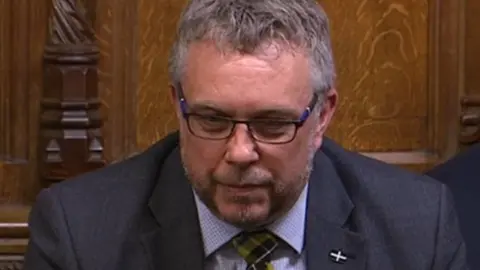 PA Media
PA MediaJay, 58, is one person who has found himself back on the streets, having been in a shelter in St Austell during lockdown.
"Tonight is my last night at the shelter, but Dave and Debbie (from Daisy Dukes) have given me a tent and sleeping bag so I have got something," he said.
"I've got an idea where I will go but it's not a good thing just moving around because someone is kicking you away."
Harbour Housing operates eight properties in and around St Austell, with space for 80 residents who would otherwise be homeless and are often living with addictions.
As well as the facilities that offer round the clock support, there are also a number of independent halfway houses. These include pubs in the centre of the town in which people can be housed when they have nowhere else to go but do not need the same level of tailored care.
Two of the pubs are on either side of a churchyard where many of the problems with open drug use and anti-social behaviour have been reported.
Percy, 58, has been placed in a room above the Queens Head pub for several months and said his life was in "limbo".
His partner has been one of the people taken off the streets and given a bed in shared accommodation during the pandemic.
"I'm not allowed to visit her, and she's not allowed to visit me," Percy said. "I'm trying to sort my life out but I'm in limbo. I really really don't know what to do."
Cornwall Council said there were more than 2,500 opiate and crack cocaine users in Cornwall, with more than 60% in treatment. This compared favourably with a national figure of 46% engagement, according to Public Health England.
The Safer St Austell partnership is carrying out an "intensive six week response" to problems in the town centre, and providing two additional needle bins.
It also wants to open a building in the town where people can get "confidential advice, information, support and treatment for drug and alcohol problems".
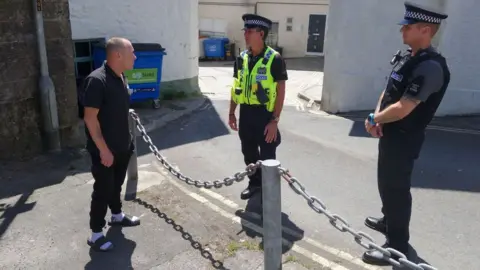
Extra Devon and Cornwall Police officers have been visiting the town since receiving "reports of groups congregating and fighting, assaults, public drug use, shoplifting and people defecating in public places", Supt Sharon Donald said.
A number of arrests have been made in the past week, and from the start of August an officer will be dedicated to the town centre.
"I've been here 20 minutes and three members of the public have come to me and said they hope we can sort it all out," PC Jim Stein said as he patrolled with a St Austell based PCSO with local knowledge of the streets and individuals.
"People were restricted in their movements under Covid lockdown and lots of homeless were put up in holiday parks.
"Now it's been lifted they are spreading their wings again and congregating in town."
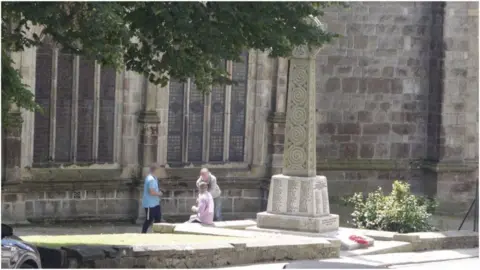
The extra police patrols appear to have helped bring about improvements in the town already - but some locals would say improvement is definitely needed.
Ivor Stone, 51, is being housed in a room in the White Hart, having himself been homeless.
"I've been here 50 years and I've never seen it this bad," he said.
He said one day he returned to his room to find somebody had left their excrement all over the outside steps with needles alongside.
"The other day there was a bloke off his head throwing parsnips at people on Fore Street. It's never ending," he added.
"It's always been known as St Awful but it's beyond that now."
- Residents of St Austell are encouraged to report any concerns using the relevant services.
